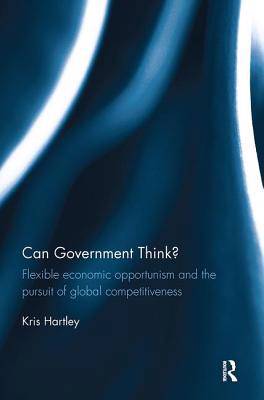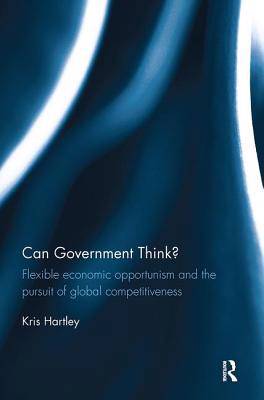
- Afhalen na 1 uur in een winkel met voorraad
- Gratis thuislevering in België vanaf € 30
- Ruim aanbod met 7 miljoen producten
- Afhalen na 1 uur in een winkel met voorraad
- Gratis thuislevering in België vanaf € 30
- Ruim aanbod met 7 miljoen producten
Can Government Think?
Flexible Economic Opportunism and the Pursuit of Global Competitiveness
Kris HartleyOmschrijving
Climate change, financial crises, and other issues of global scale no longer concern only the developed world. The binding power of globalization has placed these challenges at the doorstep of almost every country, testing the evolutionary capacity of monolithic governance systems bound by institutional legacy and administrative stagnation. This book locates the concept of adaptive governance, used primarily in environmental management, within the context of economic policy. Introducing flexible economic opportunism, it argues that a particular style of institutional and administrative versatility enables innovative, evidence-based policy development.
This book mines institutional economics, public administration, and research theory and practice for complementary elements that can inform an emerging governance paradigm based on flexible economic opportunism. Through an eclectic suite of cases from the developing and developed worlds including Asia and North America, this book reveals how patterns of institutional and administrative change impact the efficacy of public policy. Flexibility may be this century's most critical dimension of global competitiveness, and systems configured to quickly and comprehensively capture economic opportunities will win the marketplace of development ideas. This book advances that discussion.
Specificaties
Betrokkenen
- Auteur(s):
- Uitgeverij:
Inhoud
- Aantal bladzijden:
- 228
- Taal:
- Engels
Eigenschappen
- Productcode (EAN):
- 9780815350712
- Verschijningsdatum:
- 22/12/2017
- Uitvoering:
- Paperback
- Formaat:
- Trade paperback (VS)
- Afmetingen:
- 156 mm x 233 mm
- Gewicht:
- 419 g

Alleen bij Standaard Boekhandel
Beoordelingen
We publiceren alleen reviews die voldoen aan de voorwaarden voor reviews. Bekijk onze voorwaarden voor reviews.











